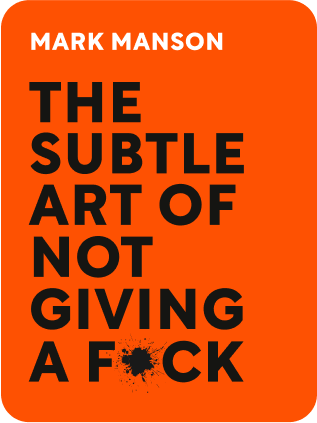

This article is an excerpt from the Shortform book guide to "The Subtle Art of Not Giving a F*ck" by Mark Manson. Shortform has the world's best summaries and analyses of books you should be reading.
Like this article? Sign up for a free trial here .
Do you care too much and find yourself stressing about things that don’t actually matter? How do you know which f*cks you should give?
In Mark Manson’s book The Subtle Art of Not Giving a F*ck, Manson explains how the era of social media makes us think that we need to care about everything. The book also discusses how to be happy, stop comparing our lives to others, and learn to only give f*cks about the right things.
Keep reading to learn how to stop giving a f*ck about everything and focusing on what matters.
Free Yourself and Stop Giving a F*ck
In The Subtle Art of Not Giving a F*ck, author Mark Manson argues that our consumer culture and social media have us chasing the wrong things in pursuit of happiness and a meaningful life. We are giving a f*ck or caring about too many things that don’t matter and don’t make us happy in the long run and we don’t know how to stop giving a f*ck.
We are urged by social media and society to give a f*ck about everything.
We are told to always be striving for more — more happiness, money, experiences, friends, possessions. The self-help movement urges us to focus on being positive and feeling good. But all the focus on positivity actually emphasizes what we lack — and so we keep striving.
As a result we become addicted to phoniness, and constantly pursue superficial things. This creates temporary highs rather than true happiness. We end up frustrated and feel that we are falling short in comparison to what we see in social media, which celebrates only the most extraordinary. Or, we develop the belief that we are entitled to always feel good.
But success, fame, and fleeting self-improvement don’t lead to satisfaction. The key to a happy, meaningful life is to stop giving a f*ck, and focus only on what is most valuable and important to us.
This book is intended to help you:
- Clarify what is important and unimportant to you.
- Realize that giving a f*ck about fewer and different things changes your direction in life.
- Understand that it’s OK to feel bad, or for things to go badly in life.
- Accept that pain is inevitable, and you can use it as a catalyst for improvement.
- Learn how to care about fewer things (give fewer f*cks).
Hurdles to Giving Fewer F*cks
There are challenges to choosing to give fewer f*cks (that is, to reprioritize what we care about and what we don’t), which include:
A misunderstanding of happiness:
- What it’s not: Contrary to what society tells us, happiness isn’t an equation to be solved or an achievement attained when we do the right things. Being unhappy and dissatisfied are part of life, and also a necessary counterweight to happiness, so happiness isn’t the avoidance of unhappiness.
- What it is: Happiness comes from solving problems and challenges. It’s an action or ongoing activity because there are constant problems to solve; each problem you solve plants the seed of another problem.
- When you misunderstand how to be happy, you give too many f*cks about the wrong things.
Overemphasizing emotions:
- The purpose of emotions is simply to give us feedback, telling us that something is good of bad for us. But many people over-identify with how they feel, and that becomes a justification for what they do (like “I broke your windshield, but I was really mad and couldn’t help it”). Emotions are part of life, not its entirety.
- You need to make decisions on what to care about based on your chosen values, not on your emotions. Making decisions based on emotions alone, without applying reason, is what kids do, and doesn’t work.
Believing that everyone is special:
- Many people’s problems in coping with life stem from the self-esteem/exceptionalism philosophy that began spreading through schools, churches and business development seminars in the 1960s and 1970s. The priority became feeling good about yourself rather than trying, failing, learning, and accomplishing things. It has produced delusional people who can’t handle challenges or adversity.
- You are not special: Your experiences and problems are shared by millions of others. When you believe you’re special, you feel entitled to feel good and have a problem-free life, which gets in the way of choosing constructive values.
Trying to avoid pain:
- Happiness involves struggling to solve problems. The question is what are you willing to fight for, what pain are you willing to take on to get what you want? The answer to this question determines how our lives turn out.
- Pain tells us what to pay attention to. From it we learn what to do differently in the future. When we strive for a life free of problems and pain, we don’t get to learn from our suffering. You can’t have a painless life. You must choose what kind of pain or struggle is meaningful to you.
Adopting destructive values. These values are pushed by our culture and media, but they crowd out good values and lead to dissatisfaction.
- Pleasure: It’s a part of life but not sufficient for happiness in and of itself. You’ll run into problems (for instance addiction or obesity) if you make superficial pleasure your priority. It’s also a value that gets in the way of relationships with others.
- Material success: People often base their self-esteem on what they own or how much money they make. But acquiring more wealth provides less and less satisfaction, once our basic needs are met. Also, when we prioritize wealth/success over deeper values, we can become shallow.
- Always being right: Research shows that we’re often wrong about things. If you feel you must be right all the time, you’ll be frustrated. Also, if you don’t admit mistakes you can’t learn from them.
- Staying positive: Staying positive has benefits, but it’s unhealthy to deny reality when it’s bad, or to repress negative emotions. Sometimes life stinks. Constantly being positive is a way of avoiding problems rather than solving them.
How to Give the Right F*cks
The antidote to a life spent pursuing superficial things rather than making choices about what to give a f*ck about is to adopt five counterintuitive values (they go against social media and cultural messages):
- Take responsibility for everything that happens in your life, whether or not it’s your fault. You may not be to blame for what happens to you, but you are responsible for choosing how you respond.
- Admit that you could be wrong: In order to grow you should entertain doubt about your beliefs, feelings, and rightness. Instead of trying to prove you’re right, you should look for ways you’re wrong, to see where you can grow. Accept that you aren’t always right.
- Embrace failure: Failure is an opportunity to learn. To succeed at something you first have to fail, usually multiple times, so you can learn.
- Practice rejection: Our culture tells us to always be positive and accepting of everything. But in order to stand for something you have to make choices, accepting some things and rejecting others that run counter to the values you’ve chosen. In order to have a healthy love relationship, you also need to be able to say and hear “no.”
- Reflect on your mortality to keep your life and values in perspective. You aren’t as obsessed with trivial things when you confront and accept the reality that you’ll die.
When you choose and live by values and standards that are meaningful and important to you, pleasure, success, and happiness will come as a result.

———End of Preview———
Like what you just read? Read the rest of the world's best book summary and analysis of Mark Manson's "The Subtle Art of Not Giving a F*ck" at Shortform .
Here's what you'll find in our full The Subtle Art of Not Giving a F*ck summary :
- How to clarify what's important to you (and not just what you think should be important)
- Why it's okay for things to not always go well in life
- Why you need to care about fewer things






